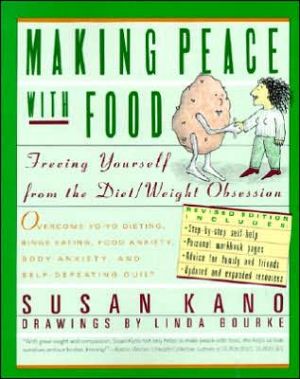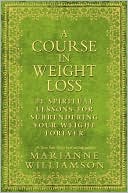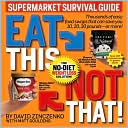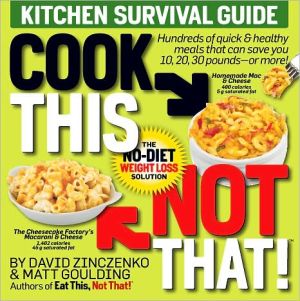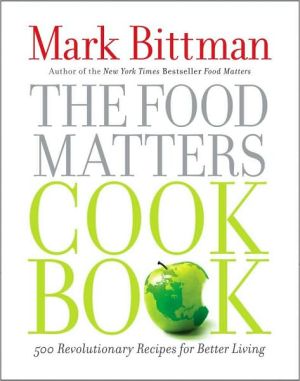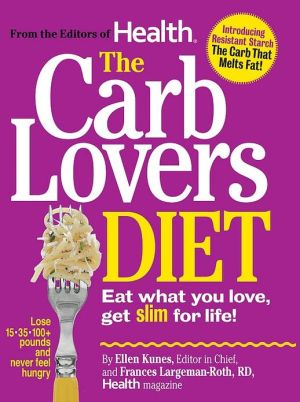Making Peace With Food: Freeing Yourself From the Diet/Weight Obsession
For millions of diet-conscious Americans, the scientifically proven, step-by-step guide to overcoming repeated weight loss and gain, binge eating, guilt, and anxieties about food and body image.\ \ \ The scientifically proven, step-by-step guide to overcoming repeated weight loss and gain.\
Search in google:
For millions of diet-conscious Americans, the scientifically proven, step-by-step guide to overcoming repeated weight loss and gain, binge eating, guilt, and anxieties about food and body image.
Chapter One\ \ \ The Problem:\ Pounds Of Fat\ Or Piles Of Pain?\ \ \ \ Do you often think about how "fat" you look? Have you ever thought, "I was bad today -- I'll starve myself tomorrow"? Do you repeatedly size yourself up in mirrors (and occasional store windows) despite the fact that your size and shape always look about the same as they did at last inspection? Do you often want to eat something but deny yourself? Have you ever felt full yet desperate to eat?\ Years ago, I had to answer "yes" to all of these questions. Many of my friends had to answer the same way. We assumed these aggravations were "inevitable" -- that we couldn't afford to stop. But none of us liked it.\ If You are struggling to become or remain thin, this book is for you. If you have developed a painful preoccupation with diet, body weight, and shape, I am speaking to You. MY goal: to help you free yourself from the diet/weight obsession.\ Don't get the wrong idea: this is not a "diet book." You have probably tried many diet and exercise programs, only to find that your problems with diet and weight remained. I am not going to send you through that treadmill again. Almost all of the people who buy diet books and go to weight-loss clinics do not overcome their problems with diet and weight. In fact, the five-year follow-up records of virtually every diet program indicate that a third to a half of dieters gain back more weight than they lose.' It is commonly estimated that only 2 to 10 percent lose weight permanently,' and even many of these dieters continue to suffer from severe conflicts surrounding their diet and weight. Very powerful andunavoidable causes, many of which are physiological, underlie this problem (see Chapter 2).\ Diet books try to answer the insistent questions of a society obsessed with thinness -- "How can we lose weight?" "How can we eat less?" "How can we maintain lower weights?" -- instead of addressing the question many of us have finally begun to ask: "How can we stop being preoccupied and upset by our eating. body weiyht, and shape?"\ I learned how to control my diet, lose weight, and maintain a very low weight. But after achieving these goals, the real problem remained: unhappiness, dissatisfaction, and pain caused by an obsession with diet, weight, and shape. In fact, my "success" intensified the problem.\ My personal experience and pain has been the primary source of motivation and insight for this book. I suffered through three years of dieting, bingeing, and yo-yoing weight (in a 30-pound range) as I struggled to become "model thin." When I thought I had succeeded, I found myself maintaining a weight of under 100 pounds (I'm 5'3"). By then I had stopped getting periods; I felt cold all the time; I suffered from the most severe depressions of my life; and all of my sexual feelings and responses had disappeared. Nonetheless, I clung to this condition through a semistarvation diet and obsessive exercise for almost two years because I was so proud to be thin and in complete control of my diet and weight.\ Most of these struggles occurred while I was a college student. My conflicts with diet and weight led me to write many papers on related topics, do my own research, run workshops for women who had eating disorders, and, finally, write my thesis on the development of eating disorders. When I completed this work, I was still keeping my weight below 100 pounds. I knew that I had to stop dealing with the subject of eating disorders as a researcher and supportcounselor, and begin dealing with it as a borderline anorexic who was determined not to become a full-fledged anorexic.\ During the next two years, I slowly but surely worked through my eating disorder. I gradually let go of strict dietary controls and regained my healthy weight. I remained conscious of my eating and weight, but I ceased to be bothered by them. I ate whatever I wanted to eat and never "dieted," yet my weight was stable. just three years before, I would have sworn that I could never eat spontaneously without endlessly gaining weight. It was a joy and a relief to let go of my eating, disorder and discover that I was wrong.\ Most of you have probably heard of eating disorders such as anorexia nervosa and bulimia. You may be wondering whether or not you have an eating disorder. Consider these questions:\ 1.Do you want to become (or remain) slender and lean, or "slimmer" than you are now?\ 2.Do you feel that without dietary controls, which require much self-denial and effort, you would become very fat?\ 3.Are you tense or anxious about controlling your eating and weight?\ 4.Is your self-esteem affected by the extent to which you maintain control over your diet and weight?\ If you answered "yes" to all of these questions, then you have what I would call an eating disorder. Many clinicians would disagree because they only recognize established eating disorders that have more visible symptoms. However, I define eating disorders from the "inside out" rather than from the "outside in." Anorexia nervosa and bulimia share a group of core symptoms that cannot be physically observed. These basic symptoms are the shared attitudes, beliefs, and fears of people who have eating disorders. You may not have anorexia or bulimia, yet think and feel like people who do. In that case, you probably suffer from what I call "chronic dieting," the most widespread eating disorder of all.\ Drawing lines between people who have eating disorders and people who don't is not the most important issue. If you are at all uncomfortable with the way you deal with your eating and weight, then you have a problem that deserves attention and relief. You do not deserve to suffer. You need not accept that suffering.\ Making Peace with Food. Copyright © by Susan Kano. Reprinted by permission of HarperCollins Publishers, Inc. All rights reserved. Available now wherever books are sold.
AcknowledgmentsixPrefacexi1.The Problem: Pounds of Fat or Piles of Pain?12.Ceasing to Diet and Discovering Our Setpoints93.Learning to Love Our Bodies354.Learning to Eat Spontaneously705.Learning to Love Ourselves946.Sorting Out Our Values1237.Expressing Our Rights and Needs1458.Nutritional Guidelines and Spontaneity: Developing a Healthy Life-style1679.Reviewing Our Steps to Freedom19910.For Sufferers' Loved Ones: Offering Support216Resources: Getting Help and Recommended Reading228Notes243Index249
